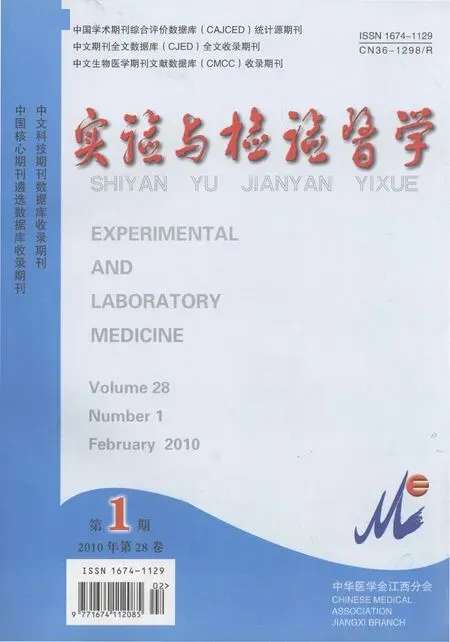在非心脏外科中术前心脏危险因素的评价钠尿肽是一种妖魔子弹吗?
王继贵
(中南大学湘雅二医院,湖南长沙 410011)
(译自:Bolliger D,等.JAm Coll Cardiol 2009,54(17):1607-1608)
在广泛的急性[1,2]和慢性[3~5]心脏病时,钠尿肽(NPs)具有充分确定其危险性的标志物。也是重要的诊断和决定治疗的基础[6~8]。在非外科病人中,NPs满足所有最近发表的临床有用的危险因素标志物的标准[9]:预后价值增加额的预期效果、改变临床处理的证据、根据改变处理其结果的改善以及分析的成本效益。相反,在外科病人,NPs作为临床危险因素标志物的作用要少得多。在外科病人中独立评价它们的价值是强制性的,因为围手术期伴随有许多特殊的问题,例如,血液动力学的迅速改变、夸大的应激反应以及高凝固性引起心肌缺血、心力衰竭、心律失常及肾衰。
在本期杂志中,Karthikeyan等[10]提出他们的meta-分析:关于在经受非心脏外科手术的病人中,NPs[脑钠尿肽(BNP)和N-末端脑钠尿肽原(NT-proBNP)]对不利心血管事件的预测价值。作者分析了9个研究,包括>3,200例病人,确定非心脏外科手术后30天内,术前NP水平升高同重要的不利心脏事件(MACE)的关系。有四分之一的病人NPs水平升高包括至少经受一个围手术期的病人,9.6%出现MACE。在调整其他已知危险因素后,合并数据显示在NP水平升高的情况下,MACE的比值比 (OR)为19.3(95%可信区间为5.8~43.7)。这些结果同最近另一份meta-分析相一致。该分析报告在经受血管外科手术的病人中30天内,MACE未校正的比值比为17.37(95%可信区间为3.31~91.15)[11]。尽管有许多完全公认的缺点和不均一的研究包括在meta-分析内,Karthikeyan等[10]在术前NPs水平升高和术后发生MACE之间的关系发现明显的证据。
从临床观点看,同等重要的是认识NPs的阴性预测价值,换句话说,在NPs水平不升高者和术后有利后果之间的关系。对于经受重要的血管外科手术的病人,我们发现BNP水平<50pg/ml的阴性预测值高至0.965(95%可信区为0.897~0.996)[12]。这个发现同经受非血管外科手术病的早先研究[13]以及同Rodseth等[11]meta-分析经受血管外科手术病人的结果相符合,提示NPs水平正常的病人可以直接进行外科手术,术前没有作额外的心脏检查。可以推测这个方法很可能提高工作效率,但是这个假设需要在将来的预期研究中证实。
根据试验结果,对于改变临床处理和后果改善的证据是危险因素标志物用途的进一步标准。用BNP指导处理心力衰竭病人,在非外科环境中己经得到证实[6,8],但是对外科病人的资料尚缺失。根据可用的资料,术前NPs水平升高的重要性和意义仍然不太清楚:病人要经受进一步的心脏检查吗?要调整心脏给药疗法吗?围手术期监测要作更多的侵袭性检查吗?或术后病人呆在ICU病房时间要延长吗?
另一个未解决的问题是术前NP检查的最佳时间。在外科手术之前开始一个新的治疗的当天,似乎不是有希望的途径。有强烈的证据表明围手术期用他汀[14,15]和 β-阻滞剂[16,17l治疗,只有在手术前至少几天到数周开始才会获益。根据NP检查需要的时间和阳性及阴性预测值,下列途径似乎是合理的:按照美国心脏病学会/美国心脏协会通行的指南[18],如果病人有中度-到高-危手术风险及存在临床危险因素和/或体力降低,应在手术安排时间之前4~5周进行BNP或NT-proBNP分析。如果NP水平低于辨别阀(此值还必需确定)。临床上病人是稳定的,可以进行手术,没有必要进一步检查。如果NP水平超过这个阀值,则作进一步的检查,给予最佳治疗,很少要进行侵袭性治疗。对这些病人,术前短期内反复检查,可以考虑调整围手术期治疗策略(外科和麻醉技术的选择、液体治疗、加强术内及术后监测),然而,必须明确地指出,这种基于NP的手段是理论性的,因此,需要在充分设计的预期试验中严密评价。
最后,Karhikeyan[10]的研究对于NPs在非心脏外科手术病人中的高预后潜力给予了重要的和明确的证据。然而,仍然需要进行研究以评价基于NP特殊治疗的改善是否将导致外科病人的后果改善。假若将来的研究发现这一概念的后果关联,NPs的确将是术前危险因素最佳化的妖魔子弹。然而,对NPs是否能作为确定危险因素的等级和有希望的检测技术,尚需作进一步的评价。
[1]De Lemos JA,Morrow DA,Bentley JH,et al.The prognostic value of B-type natriuretic peptide in patients with acute coronary syndromes[J].N Engl JMed,2001,345:1014~1021.
[2]Waldo SW,Beede J,Isakson S,et al.pro-B-type natriuretic peptide levels in acute decompensated heart failure[J].JAm Coll Cardiol,2008,51:1874~1882.
[3]Bibbins-Domingo K,AnsariM,Schiller NB,et al.B-type natriuretic peptide and ischemia in patientswith stable coronary disease:data from the Heart and Soul study[J].Circulation,2003,108:2987~2992.
[4]Daniels LB,Maisel AS.Natriuretic peptides[J].JAm Coll Cardiol,2007,50:2357~2368.
[5]NishiiM,Inomata J,Takehana H,et al.Prognostic utility of B-type natriuretic peptide assessment in stable low-risk outpatients with nonischemic cardiomyopathy after decompensated heart failure[J].J Am Coll Cardiol,2008,51:2329~2335.
[6]Jourdain P,Jondeau G,Funck F,et al.Plasma brain natriuretic peptide-guided therapy to improve outcome in heart failure: the STARS-BNPMulticenter Study[J].JAm Coll Cardiol,2007,49:1733~1739.
[7]Mueller C,Scholer A,Laule-kilian K,et al.Use of B-type natriuretic peptide in the evaluation and management of acute dyspnea[J].N Eng1 JMed,2004,350:647~654.
[8]Troughton RW,Frampton CM,Yandle TG,etal.Treatment of heart failure guide by plasma aminoterminal brain natriurctic peptide(N-BNP)concentration[J].Lancet,2000,355:1126~1130.
[9]Hlatky MA,Greenland P,Arnett DK,et al.Criteria for evaluation of novelmarkers of cardiovasculal risk:a scientific statement from the American Heart Association[J].Circulation,2009,119:2408~2416.
[10]Karthikeyan G,Moncur RA,Levine O,et al.Is a opre-operative brain natriuretic peptide of N-terminal pro-B-type natriuretic peptide measurement an independent predictor of adverse cardiovascular outcomes with in 30 days of noncardiac surgery? A systematic review and meta-analysis of observational studies[J].JAm Coll Cardiol,2009,54:1599~1606.
[11]Rodseth RN,Padayachee L,Biccard BM.A meta-analysis of the utility of pre-operative brain natriuretic petpide in predicting early and intermediate-term mortality and major adverse cardiac events in vascular surgical patients[J].Anaesthesia,2008,63:1226~1233.
[12]Bolliger D,Seeberger MD,Lurati Buse GA,et al.A preliminary report on the prognostic significance of preoperative brain natruretic peptide and postoperative cardiac troponin in patients undergoing major vascular surgery[J].Anesth Analg,2009,108:1069~1075.
[13]Dernellis J,Panaretou M.Assessment of cardiac risk befor noncardiac surgery brain natriuretic peptide in 1590 patients[J].Heart,2006:92:1645~1650.
[14]Durazoo AE,Machado FS,Ikeoka DT,et al.Reduction in cardiovascular events after vascular surgery with atorvastatin:a randomized trial[J].JVasc Surg,2004,39:967~976.
[15]Poldermans D,Schouten 0,Bax JJ,et al.Reducing cardiac risk in non-cardiac surgery:evidence from the DECREASE studies(abstr)[J].Eur Heart J,2009,11:9~14.
[16]Devereaux PJ,Yang H,Yusuf S,et al.Effects of extended-release metoprolol succinate in patients undergoing non-cardiac surgery(POISE trial):a randomised controlled trial[J].Lancet,2008,371:1839~1847.
[17]Poldermans D,Boersma E,Bax JJ,et al.for the Dutch Echocardiographic Cardiac Risk Evaluation Applying Stress Echocardio graphy study Group.The effect of bisoprolol on perioperativemortality and myocardial infarction in high-risk patients undergoing vascular surgery[J].N Engl JMed,1999,341:1789~1794.
[18]Fleisher LA,Beckman JA,Brwn KA,et al.ACC/AHA 2007 guidelines on perioperative cardiovascular evaluation and care for noncardiac surgery:executive summary.A report of the American College of Cardiology/American Heart Association Task Force on Practice Guidelines (Writing Committee to Revise the 2002 Guidelines on perioperative Cardiovascular Evaluation for Noncardiac surgery)[J].Am Coll Cardiol,2007,50:1707~1732.

